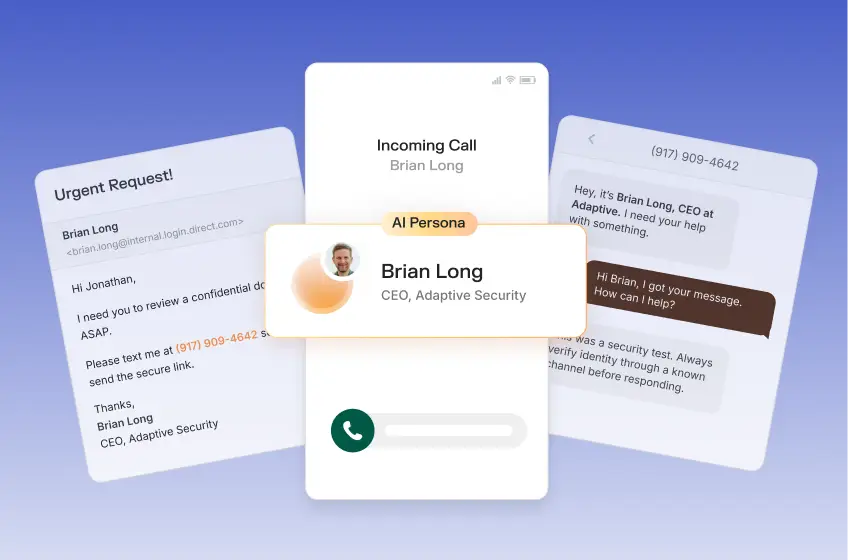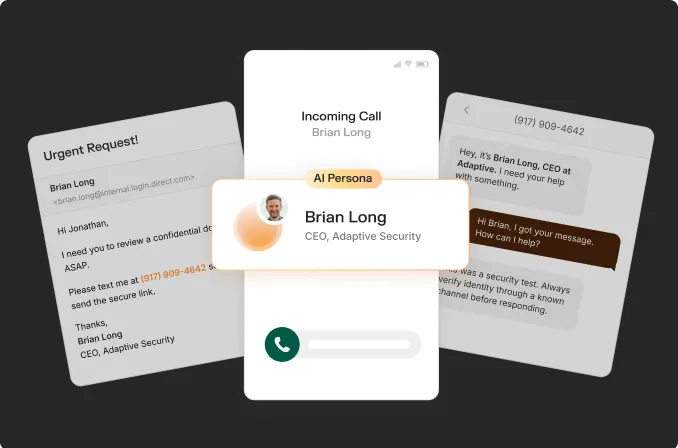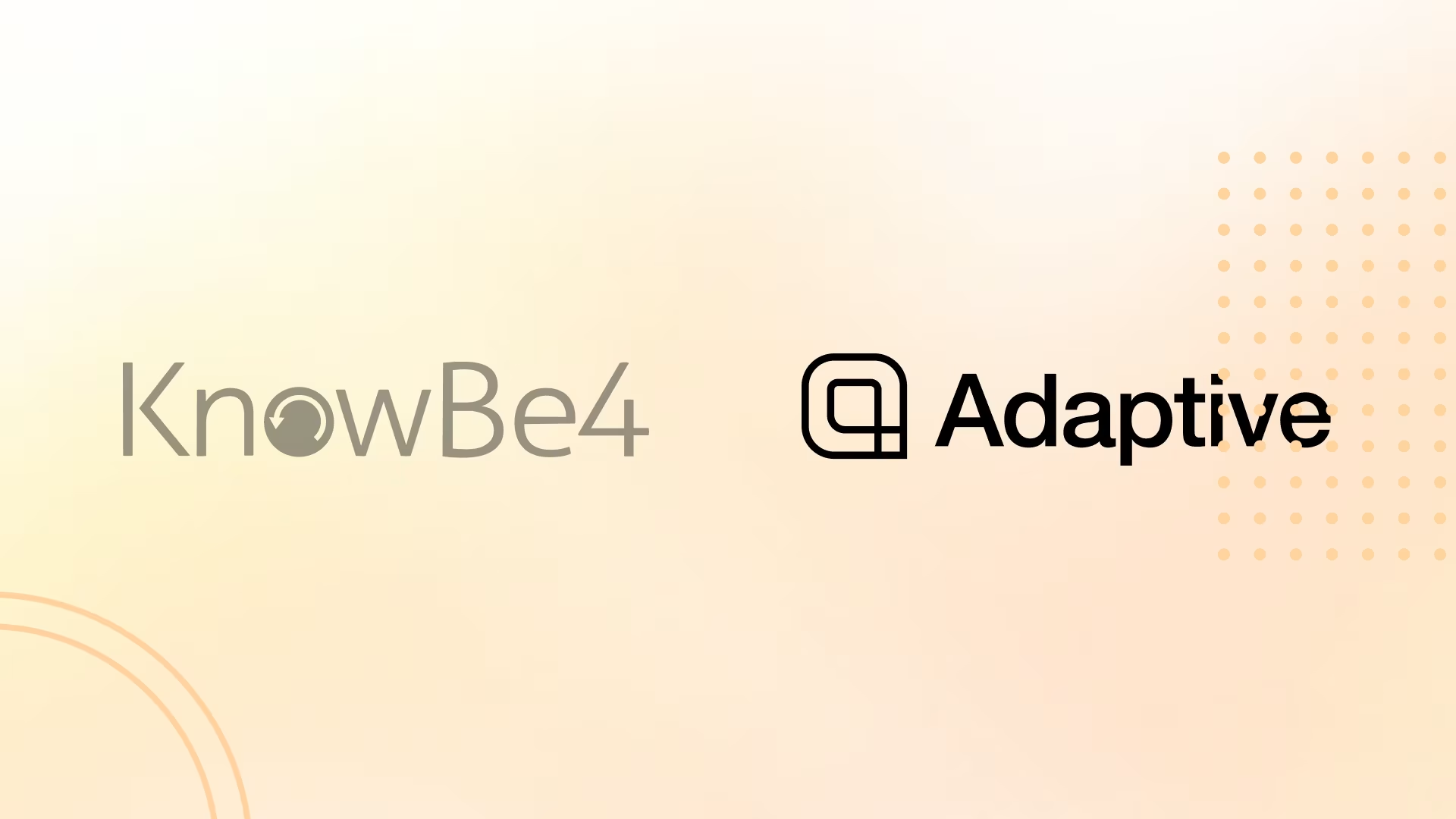KnowBe4 has been an incumbent as a security awareness training platform for over a decade, providing an extensive library of content and mature infrastructure. However, its clunky UX and limited innovation and customization might not make it the best fit for your organization.
If you’re considering KnowBe4 or switching to another security awareness training platform, this guide will help you decide which of the following options is right for you.
- Adaptive Security
- Proofpoint
- Hoxhunt
- SoSafe
- Cofense PhishMe
- Infosec IQ
- NINJIO
- SANS
- Mimecast
- MetaCompliance
Top 10 KnowBe4 alternatives and competitors on the market in 2025
1. Adaptive Security
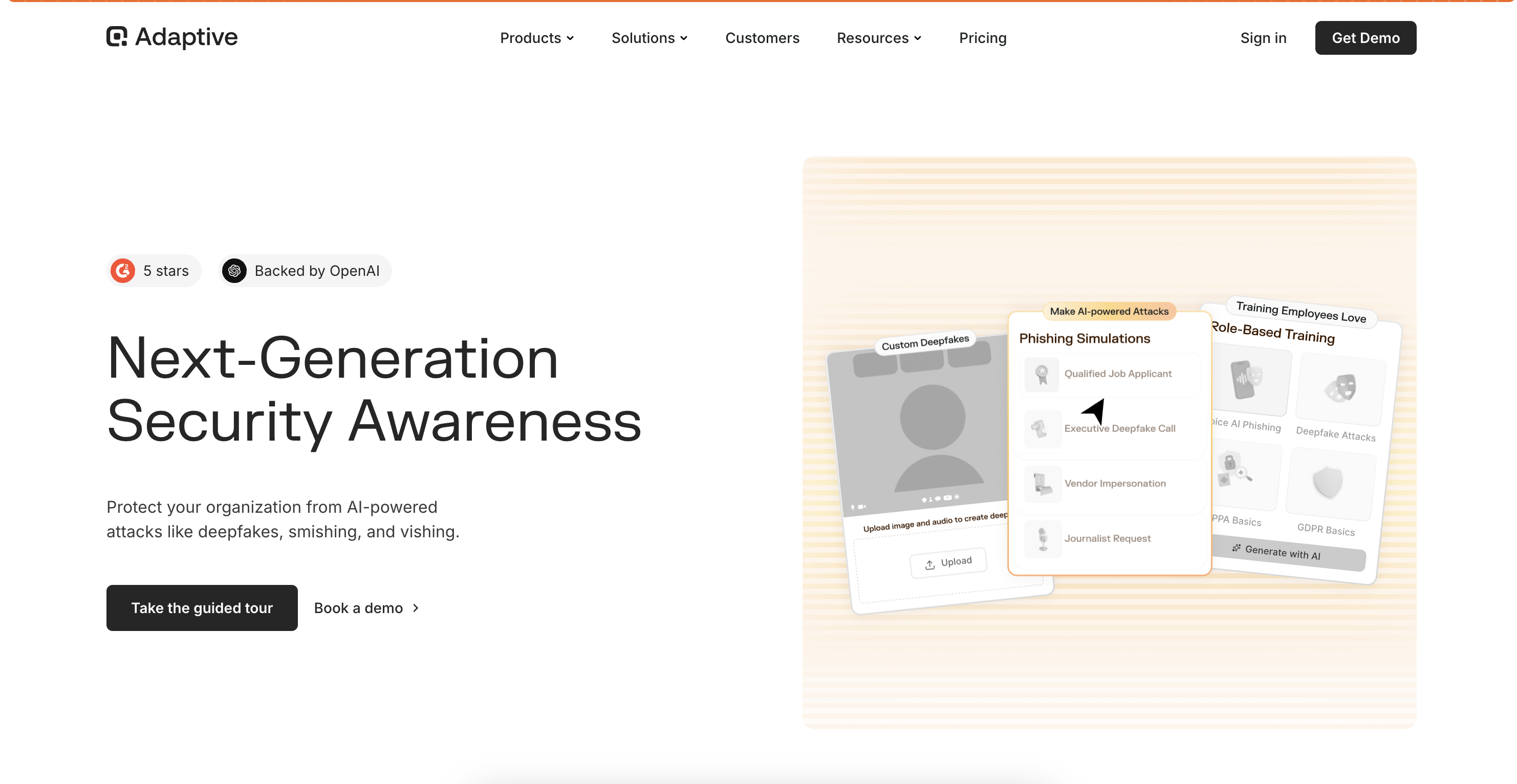
Backed by OpenAI as its first and only cybersecurity investment, Adaptive Security is a next-generation security awareness training and phishing simulation platform built for evolving AI-powered attacks, such as deepfakes, voice phishing, and SMS phishing.
Adaptive Security is loved by hundreds of companies worldwide, including Figma, Ramp, Lennar, and Plaid.
Key features and benefits:
- Completely editable interactive security training featuring embedded deepfake personas.
- AI Content Creator instantly builds custom training tailored to any company or role.
- Advanced phishing simulations that use deepfakes and AI personas to mirror real-world attacks with striking realism.
- Unified modern platform streamlines training, simulations, reporting, and analytics in one place.
- Dedicated success managers provide hands-on support for every client.
- Competitive pricing delivers next-gen protection at a lower cost than legacy providers.
- Future-ready training tackles AI-driven threats while covering all core business functions.
- Intuitive admin portal offers clean visuals and simple, efficient navigation.
Limitations:
- Frequent product updates may require admins to stay current with documentation and adapt workflows.
Adaptive Security is an excellent choice for future-oriented organizations concerned about the next generation of AI threats. With Adaptive Security, companies can track their generative AI risk levels and prepare their team for multichannel security threats.
2. Proofpoint
Proofpoint’s security awareness training platform is designed to enable organizations to adopt a simulation-based approach while maintaining their threat detection capabilities.
Key features and benefits:
- Realistic phishing simulations updated to reflect modern threats.
- Tight integration with Proofpoint’s email security platform for unified threat detection and training.
- Solid training content with interactive modules and quizzes.
Limitations:
- Challenging and time-consuming setup and configuration process.
- Platform complexity leads to a steep learning curve requiring dedicated staff.
- Support and documentation can be slow or sparse.
- Training content feels generic and lacks personalization.
Proofpoint is a valuable integrated email security and training solution. However, it could benefit from a more personalized learning experience and a forward-thinking approach. Proofpoint feels limited for organizations keeping an eye on the ever-changing nature of cybersecurity.
3. Hoxhunt
Hoxhunt places gamification at the center of its security awareness training platform. It focuses on behavior change, delivering personalized phishing simulations and automated training to reduce human risk at scale.
Key features and benefits:
- Engaging, game-like training experience with points, badges, and leaderboards.
- Realistic and adaptive phishing simulations tailored to user performance.
- Intuitive interface for both employees and admins with easy email integration and clear reporting dashboards.
Limitations:
- Training content can become repetitive over time.
- Some users find gamification quirks frustrating, such as penalties for slow phishing reporting.
- Initial setup and customization require significant effort and can be complex.
Hoxhunt is good for organizations seeking engaging, behavior-changing training with minimal administrative upkeep. However, it lacks some flexibility and requires careful setup.
4. SoSafe
SoSafe is a security awareness platform with a focus on localized, gamified learning. It emphasizes interactive micro-learning and adaptive content to drive long-term behavior change, including support for multiple languages and regional customization.
Key features and benefits:
- Gamified content fosters friendly competition and higher engagement.
- Behavior-driven training adapts to each user’s security maturity.
- Customizable phishing simulations tailored to industry and local languages, particularly in Europe.
Limitations:
- Complex and time-consuming initial setup, especially for smaller teams.
- Reporting and dashboards lack depth, resulting in limited granular insights.
- Limited mobile and offline access, as well as fewer advanced gamification features.
- Language support and cultural tailoring could be improved for global companies.
Despite being a fun, personalized training experience that adapts to users, SoSafe lacks sophisticated reporting and flexibility.
5. Cofense PhishMe
Cofense PhishMe is a legacy solution for security awareness training and phishing simulations focused on threat detection and response training. It provides extensive phishing email scenarios and integrates with incident response tools to train users and remediate threats.
Key features and benefits:
- Large library of phishing templates and training content based on real-world attacks.
- Deep customization options for templates and campaign settings.
- Comprehensive reporting with detailed stats and analytics.
- Responsive, hands-on vendor support during setup and operations.
Limitations:
- User interface feels unintuitive, and navigation can be confusing.
- Limited localization and fewer region-specific phishing scenarios.
- Training feedback is primarily provided only to users who perform simulations, missing others.
While it has extensive phishing content and robust analytics, Cofense PhishMe lacks modern polish and uniform training reinforcement.
6. Infosec IQ
Infosec IQ offers a broad library of security awareness training materials, phishing simulations, and compliance-focused content. It emphasizes scalability and customizable learning paths designed to fit different industries and organizational needs.
Key features and benefits:
- Extensive library of courses, phishing templates, and compliance training.
- Easy-to-use platform with customizable learning paths and automation.
- Strong reporting and analytics for tracking user progress and risks.
- Frequent content updates reflecting emerging threats and regulations.
Limitations:
- Training modules can feel long and less interactive compared to gamified platforms.
- Support is limited to U.S. time zones, offering limited customer support to global customers.
- Personalization options for global or multilingual audiences may be less intuitive.
- Integration with other security tools may require more configuration than competitors.
Infosec IQ is a solid, well-rounded platform for organizations needing compliance-ready training, but it lacks some of the engagement features and adaptive personalization offered by newer, gamified solutions.
7. NINJIO
NINJIO is a storytelling-driven security awareness platform, known for its Hollywood-style, animated microlearning episodes that deliver security lessons in short, engaging formats. It aims to boost recall and engagement through narrative-based training.
Key features and benefits:
- High-quality, animated video episodes designed to capture attention.
- Bite-sized microlearning format makes training quick and engaging.
- Frequent new content releases based on real-world cyber incidents.
- Strong focus on improving recall and knowledge retention through storytelling.
Limitations:
- Limited hands-on phishing simulation capabilities compared to competitors.
- Reporting and administrative dashboards may be less detailed or intuitive than competitors.
- Content might feel too lightweight for compliance-heavy or highly regulated environments—lacking depth or analytical granularity.
- Some users report platform glitches (especially after transitions), email delivery issues, and a learning curve for admins.
NINJIO excels at engaging employees with memorable, story-driven lessons, but may not be the best fit for organizations wanting deep reporting, complex simulations, or compliance-heavy features.
8. SANS
SANS Security Awareness is an authoritative, expert-led program built to foster a proactive security culture within organizations. Developed by seasoned cybersecurity professionals, the platform delivers comprehensive, up-to-date training on phishing, social engineering, data protection, and regulatory compliance (including GDPR and HIPAA).
Through engaging, interactive content, SANS ensures employees retain and apply critical security practices, helping organizations significantly strengthen their overall security posture.
Key features and benefits:
- Educational content developed by cybersecurity experts.
- Comprehensive coverage of phishing, social engineering, compliance, and data protection.
- Interactive training designed to enhance knowledge retention and application.
- Strong reputation and credibility as an industry leader.
- Informative and in-depth modules that support organizational maturity.
Limitations:
- Expensive compared to competitors, making it harder for smaller organizations to adopt.
- Some courses can feel overly complex or academic in tone.
- Steeper learning curve and less user-friendly than gamified alternatives.
- Training modules may feel overcomplicated for casual learners.
SANS Security Awareness is ideal for organizations seeking credibility, depth, and compliance-focused training from recognized experts. However, its higher cost, complexity, and limited accessibility may deter smaller teams or those seeking simpler, more engaging training experiences.
9. Mimecast
Mimecast provides security awareness training integrated into its broader email and cloud security ecosystem. Its training content focuses on reducing human risk through engaging microlearning videos and phishing simulations.
Key features and benefits:
- Seamless integration with Mimecast’s email security and threat detection.
- Short, engaging video content designed to maintain attention.
- Phishing simulations tied directly to real-world attack data.
- Strong administrative tools for tracking and managing campaigns.
Limitations:
- Training library is smaller compared to standalone platforms.
- Content can feel repetitive for long-term programs.
- Reporting dashboards are solid but less customizable than competitors.
Mimecast is best suited for organizations already using its email security suite, offering an integrated approach to training and phishing defense.
10. MetaCompliance
MetaCompliance combines security awareness training with compliance, policy management, and privacy modules. Its focus is on aligning user training with organizational policies while ensuring regulatory adherence.
Key features and benefits:
- Strong compliance and policy management integration.
- Training content covers cybersecurity, GDPR, data protection, and more.
- User-friendly policy acknowledgment workflows.
- Available in multiple languages for global organizations.
Limitations:
- Training content is less dynamic compared to gamified competitors.
- Limited phishing simulation sophistication and customization.
- Reporting is geared more toward compliance audits than deep behavior analysis.
- Admin user experience can be overly complicated and challenging to navigate.
MetaCompliance is a good fit for organizations prioritizing compliance and policy alignment, but it may fall short for teams seeking modern engagement methods and adaptive phishing simulation capabilities.
Comparison chart: Breaking down the top 10 KnowBe4 alternatives
The final word: Why Adaptive Security stands out as a KnowBe4 alternative
Deciding on a security awareness training platform can be challenging due to the variety of options available.
Adaptive Security enables users to gain hands-on experience with emerging cyberattacks. The platform can create AI personas for deepfakes of anyone within an organization and instantly implement them into training and simulations.
While the platform offers extensive training tailored to compliance, specific departments, and industries, Adaptive Security’s AI Content Creator enables managers to easily create content tailored to any of an organization’s needs.
Onboarding is quick and efficient, even for non-technical users, and Adaptive Security’s 30+ integrations make it seamless to connect to your organization.
Book a demo today and discover how Adaptive Security delivers customizable, behavior-changing security awareness training, built for modern threats.
FAQs about KnowBe4 alternatives
What should I look for in a security awareness training solution?
Here’s a breakdown of the most important factors to consider in your security awareness training software:
- Future-Oriented: The platform should directly confront the changing landscape of security. With the development and expansion of artificial intelligence (AI), the next generation of security threats poses new and unforeseen dangers.
- Engagement: Training should come in multiple forms, including videos, quizzes, and gamification, and in short, bite-sized content.
- All-in-One Platform: You shouldn’t be jumping back and forth between software for training, simulations, or tracking. You should have a single platform that allows you to conduct training, track fail rates, enroll employers, simulate attacks, and more.
What’s the best KnowBe4 alternative on the market?
For organizations that want to stay ahead of evolving attacks, Adaptive Security is the top alternative. It’s the only major platform designed from the ground up for AI-era threats (deepfakes, voice phishing, SMS phishing) while still covering all traditional training needs.
How does Adaptive Security compare to KnowBe4?
Adaptive Security offers incredibly realistic deepfake phishing tests that add a level of unheard-of realism to cybersecurity awareness training. KnowBe4 offers more traditional phishing training without deeply realistic deepfakes.
Why do companies switch from KnowBe4 to other platforms?
Companies often want better attack simulations to prepare employees for cybersecurity threats. They also may be looking for premier dashboard functionality or a blend of traditional curricula with advanced training programs.
Adaptive Security addresses all of these concerns directly, making it a top choice for forward-looking organizations.
Does KnowBe4 offer deepfake or generative AI phishing simulations?
KnowBe4 has only limited, experimental offerings in this area. In contrast, Adaptive Security was built around AI-powered threat simulation. Its deepfake and generative AI features are core to the product, not an afterthought—giving organizations a realistic, hands-on defense against the kinds of attacks that are just beginning to surface.
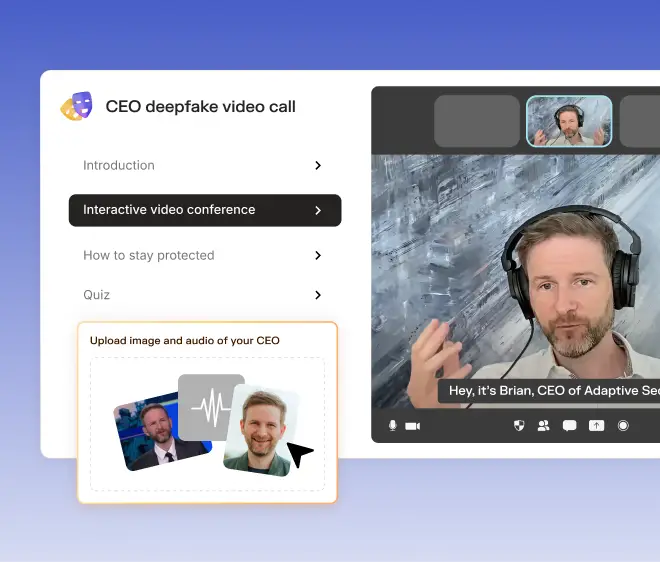



As an avid writer and startup enthusiast, Eitan became acutely aware of how bad actors might misuse AI to breach organizations and cause immense disruption.
Contents
